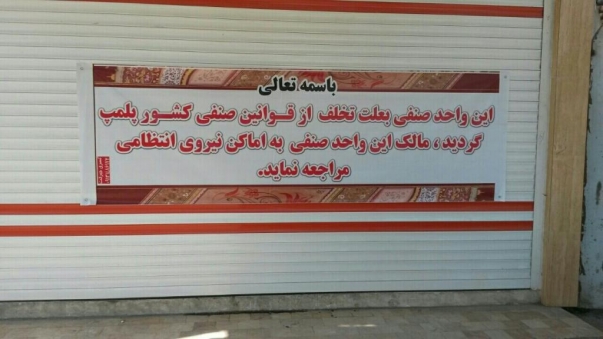Source: Baha’i World News Service
GENEVA — Tens of Baha’is’ shops in the cities of Rafsanjan, Kerman, Sari and Hamadan have been sealed by government authorities in an effort to pressure Baha’is not to observe their religious holy days.
These shops, mostly small businesses, offering services like household appliance repairs or the sales of automobile parts or clothing, were sealed in April and May when the owners closed their stores in observance of Baha’i holy days during those months.
Further to these closures, Iranian authorities told some of the shopkeepers that if they do not sign a pledge that they will only close their stores on recognized national holidays their business licenses will be revoked and their stores closed permanently.
“This recent attempt by authorities in Iran to prevent Baha’i shop owners from observing Baha’i holy days on a few days of the year is an act against the laws of Iran itself and one which violates international human rights norms,” said Ms. Diane Ala’i, representative of the Baha’i International Community’s United Nations office in Geneva.

“Such small enterprises are virtually the only means of economic subsistence left to Baha’is and their families in Iran today” said Ms. Ala’i. “Baha’is have been banned from all government employment and other private sector businesses are frequently pressured to dismiss them.”
Many or all of these same shops had been shut down by authorities last October when at least 80 shops in those same cities as well as in the city of Jiroft were closed by authorities after the owners temporarily closed their businesses to observe Baha’i holy days. After extensive appeals by the Baha’is, and some international publicity about the closings, the shops were eventually allowed to reopen. These actions have been reported in the 2015 annual report of the European Parliament Intergroup on Freedom of Religion or Belief and Religious Tolerance titled “State of Freedom of Religion or Belief”.
“These recent developments take the persecution against the Baha’is in Iran to a new level entirely, because it is not as if the Baha’is openly advertise that they close their shops because of a Baha’i holy day,” Ms. Ala’i said. “They merely wish to exercise their right to freedom of worship.”
“It is all clearly part of a continuing effort by the government to make Baha’is invisible by striving to eliminate all aspects of their existence,” she said.
The news comes just as governments, employers, and workers’ representatives from around the world gather in Geneva for the 104th International Labour Conference, where the topic of discrimination in the workplace is a major concern.
“The fact that news of these incidents, blatant examples of religious persecution, come as the world is discussing workplace discrimination only serves to highlight once again the degree to which Iran has failed to live up to international human rights norms,” said Ms. Ala’i.
She noted that in 2014, the International Labour Organization, at the 103rd International Labour Conference, called on Iran to address discrimination against Baha’is, saying it has “deep concern” regarding “the systematic discrimination against members of religious and ethnic minorities, particularly the Baha’is, and once again urges the Government to take immediate and decisive action to address such discrimination”.
Baha’is are officially restricted from engaging in certain types of businesses. In 2007, the Public Places Supervision Office issued a letter to police throughout the country saying Baha’is should be banned from “high-earning businesses” and from “sensitive” categories, such as the press, jewelry, photography, and computer and Internet-related businesses, as well as the food industry.
Moreover, small shops run by Baha’is have not only been the subject of frequent closures by government agents but also arson attacks and other assaults, perpetrated in an atmosphere where hatred against Baha’is has been incited through a national anti-Baha’i media campaign, as has beendocumented previously.
Leave a Reply